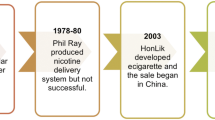Summary.
Objectives: To compare smoking behaviour, attitudes and opinions towards smoking and smoking cessation among Estonian and Finnish physicians.
Methods: A cross-sectional postal survey using a self-administered questionnaire was carried out among 2 480 Estonian and 2 075 Finnish physicians.
Results: Daily smoking prevalence was higher among Estonian physicians than among their Finnish counterparts in both male (18.6% and 6.7%) and female (6.6% and 3.6%). Compared to Estonia, physicians in Finland more often agreed that smoking is very harmful to their health, that trying to convince people to stop smoking is their responsibility and that smoking prevention should be part of the normal and special training of health professionals. In both countries, non-smoking physicians held more unfavourable attitudes towards smoking than those who were smoking.
Conclusions: Physicians’ own smoking patterns and quitting behaviour are important because physicians serve as models for their patients and play a key role in the reinforcement of smoke-free health facilities. These results remain a challenge to medical educators, especially in Estonia. Estonia needs to improve medical education in terms of motivating physicians to ask about the smoking patterns of their patients and of training medical students and resident physicians to counsel their patients to stop smoking.
Zusammenfassung.
Vergleich der Kenntnisse, Einstellungen und des eigenen Verhaltens bezüglich des Rauchens zwischen der estnischen und der finnischen Ärzteschaft
Fragestellung: Es werden die Unterschiede in den Rauchgewohnheiten, in der Einstellung und den Ansichten über das Rauchen und die Raucherentwöhnung zwischen estnischen und finnischen Ärzten untersucht.
Methoden: Eine Querschnittsstudie mit selbstauszufüllendem Fragebogen wurde bei 2 480 estnischen und 2 075 finnischen Ärzten durchgeführt.
Resultate: Die tägliche Rauchprävalenz war sowohl bei den Ärzten (18,6%) als auch bei den Ärztinnen (6,6%) in Estland höher als bei ihren finnischen Kollegen (6,7%) und Kolleginnen (3,6%). Verglichen mit Estland, waren Ärzte in Finnland öfters der Meinung, dass Rauchen sehr schädlich für ihre Gesundheit ist, dass sie dafür verantwortlich sind, ihre Patienten davon zu überzeugen, dass es wichtig ist, aufzuhören zu rauchen, und dass Tabakprävention ein Teil der normalen und speziellen Ausbildung von Gesundheitsfachleuten sein sollte. In beiden Ländern hatten nichtrauchende Ärzte gegenüber dem Rauchen eine stärker ausgeprägte negative Haltung als die rauchenden.
Schlussfolgerung: Dem Rauchverhalten der Ärzteschaft selbst kommt wegen deren Vorbildfunktion gegenüber den Patienten eine Schlüsselrolle bei der Erreichung von rauchfreien Gesundheitseinrichtungen zu. Diese Resultate zeigen, dass die medizinische Ausbildung vor allem in Estland betreffend Rauchen noch ein Verbesserungspotential hat. Estland muss die medizinische Ausbildung so verbessern, dass Ärzte mehr motiviert sind, mit ihren Patienten über das Rauchen zu sprechen. Zudem sollten Studierende der medizinischen Fächer aber auch bereits praktizierende Ärzte dahingehend geschult werden, dass sie ihre Patienten stärker zur Raucherentwöhnung motivieren können.
Résumé.
Connaissances, attitudes et comportements des médecins estoniens et finlandais envers le tabagisme
Objectifs: Comparer les habitudes de consommation de tabac, les attitudes et les opinions concernant le tabagisme et la cessation tabagique parmi les médecins estoniens et finlandais.
Méthodes: Enquête par questionnaire auto administré, auprès de 2 480 médecins estoniens et de 2 075 médecins finlandais.
Résultats: La prévalence du tabagisme était plus élevée parmi les médecins estoniens que parmi leurs collègues finlandais, tant pour les hommes (18,6% et 6,7%) que pour les femmes (6,6% et 3,6%). Les médecins en Finlande ont accepté plus souvent qu’en Estonie l’idée que le tabagisme est très nuisible pour leur santé, qu’il est de leur responsabilité de convaincre les gens de cesser de fumer et que la prévention du tabagisme devrait être un sujet normalement abordé dans la formation des professionnels de la santé. Dans les deux pays, les médecins non-fumeurs avaient une attitude plus défavorable envers le tabagisme que les médecins fumeurs.
Conclusion: L’attitude des médecins concernant le tabagisme et la cessation tabagique est importante car ils servent de modèles pour leurs patients et ils jouent un rôle-clé pour assurer que le système de santé offre un environnement sans tabac. L’Estonie surtout a besoin d’améliorer la formation des médecins pour inciter ces derniers à interroger leurs patients sur leurs habitudes tabagiques et pour enseigner aux étudiants et aux internes comment informer leurs patients sur les programmes de cessation tabagique.
Similar content being viewed by others
Author information
Authors and Affiliations
Corresponding author
Rights and permissions
About this article
Cite this article
Pärna, K., Rahu, K., Barengo, N.C. et al. Comparison of knowledge, attitudes and behaviour regarding smoking among Estonian and Finnish physicians. Soz.-Präventivmed. 50, 378–388 (2005). https://doi.org/10.1007/s00038-005-4089-z
Received:
Accepted:
Published:
Issue Date:
DOI: https://doi.org/10.1007/s00038-005-4089-z



